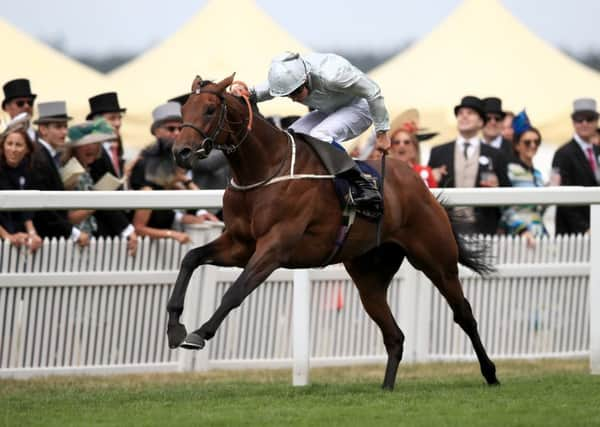Johnston anger at Permian critics


The globe-trotting three-year-old was running for the eighth time this season and had finished a disappointing last of six in the Group One Secretariat Stakes in Arlington, Chicago, when she shattered his left leg, firing jockey William Buick into the turf.
A decision was taken by Johnston’s son, Charlie, a qualified vet, to have Permian euthanased immediately because of the catastrophic injury, rather than move the stricken horse into an equine ambulance under medication.
Advertisement
Hide AdAdvertisement
Hide AdNot only was this criticised on social media forums but others blamed jockey William Buick who was left with a fractured lower back when he was thrown from the horse. He’s now flown back to Britain and is due to undergo further assessment to ascertain the length of his lay-off.
Johnston says his son, and Permian’s devoted groom Gavin Hardisty, were with the horse within 30 seconds of the calamity while jockey Frankie Dettori dismounted and went the aid of the aforementioned Buick. “It never ceases to amaze me that animals, and particularly horses, can suffer horrendous injuries and show little or no sign of being in pain,” wrote the Middleham trainer on his blog.
“The effect of endorphins and adrenalin on the flight animal – nature’s survival mechanism – is verging on miraculous but it doesn’t last long and Charlie did exactly as I would have done in ensuring that the horse was spared any suffering. A good decision.
“The messages of condolence were rolling in by email, on Facebook, and on Twitter within minutes of the horse’s death and I can assure you that they are all greatly received.
Advertisement
Hide AdAdvertisement
Hide Ad“Sadly, in reading them, I couldn’t help but see the others from a minority who sought to blame me for the horse’s demise and accuse Charlie of callousness because he, to my mind, acted practically in the horse’s best interests rather than concern himself with the public perception of the event.”
Johnston senior, who is also a vet, added: “The number of negative comments was in single figures, amongst hundreds of genuine condolences, but they hurt nonetheless and not because there was any truth in them.
“I find it sad that people jump to the conclusion that an accident like this happens because of one too many runs. We all know that there is a risk of injury if you run and, if you run very fast the risk is increased. But we do not know that the risk on the eighth start is any greater than the risk on the first. It might even be that the risk is less if you go fast more often than it is if you have long gaps between racing. Some scientists are now suggesting that, to minimise the risk of injury, we should be working horses at maximum pace over a short distance every other day.
“It is a very interesting subject and one that occupies a huge amount of my time but, frankly, I can do without the advice from those that know nothing about it and only put their brain into gear ten minutes after their lips start moving.
Advertisement
Hide AdAdvertisement
Hide Ad“And, as to the one person who sought to blame William Buick because ‘surely he should have known something was wrong’, I wonder if he would keep going if he thought it likely that he was about to be catapulted into the ground from a horse travelling in excess of 30mph. I have no complaints about anyone’s actions. I would employ the same team tomorrow in the full knowledge that nobody could do a better job.”